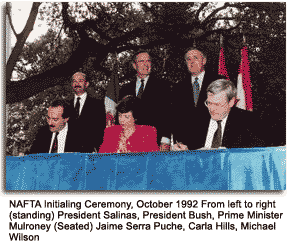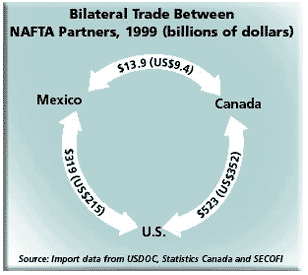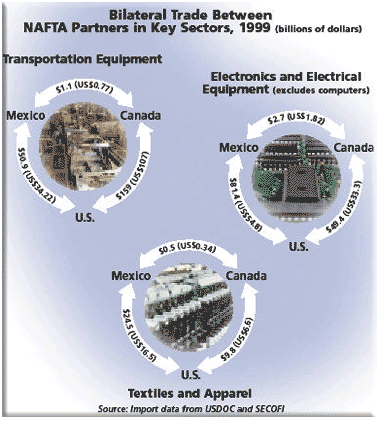In a recent version of the Good Neighbor Policy, the world`s largest free trade area was created when the United States, Canada and Mexico launched the North American Free Trade Agreement (NAFTA). That agreement has brought economic growth and higher standards of living for all three countries, and is committed to helping the partners to realize a more integrated and efficient North American economy.
 NAFTA took effect on January 1, 1994. The agreement immediately lifted tariffs on the majority of goods produced by the signatory nations. It also called for the gradual elimination, over a period of 15 years, of most remaining barriers to cross-border investment and to the movement of goods and services among the three countries. Major industries affected include agriculture, automobile and textile manufacture, telecommunications, financial services, energy, and trucking. NAFTA was followed by the signing of the General Agreement on Tariffs and Trade (GATT/World Trade Organization (WTO), also in 1994.
NAFTA took effect on January 1, 1994. The agreement immediately lifted tariffs on the majority of goods produced by the signatory nations. It also called for the gradual elimination, over a period of 15 years, of most remaining barriers to cross-border investment and to the movement of goods and services among the three countries. Major industries affected include agriculture, automobile and textile manufacture, telecommunications, financial services, energy, and trucking. NAFTA was followed by the signing of the General Agreement on Tariffs and Trade (GATT/World Trade Organization (WTO), also in 1994.
The WTO administers a variety of agreements, covering, among other things, trade in goods, trade in services, foreign investment, government procurement, and intellectual property. Such regional trade agreements as NAFTA interact with the global regime in ways that can make or break a firm’s business strategy. Moreover, regional trade agreements can offer clues to the directions in which global agreements may be headed.
Like any multinational treaty, NAFTA has its pros and cons, its cheerleaders and detractors. More than 10 years after the treaty was signed, protests continue, especially by citizenry "south of the border." NAFTA seems to favor North America`s big business over the needs of Latin America`s indigenous peoples. While jobs may have been created in Latin America, the pay is generally low and available jobs are far from home. The benefits appear to go to governments, rich land owners, and large businesses.
The new NAFTA economies apparently have disrupted traditional agrarian lifeways as well. Formerly successful agrarian families, once able to send their children to college, find the markets for their traditional crop, such as corn, have been undercut by multinational agricultural corporations. The small farmers can`t sell their corn at a profitable price.
No official NAFTA compensation or reparations structure seems to exist to cope with the widespread disenfranchisement of indigenous families dependant on traditional, but obsolete local economies.
 The following information is derived from the official NAFTA website:
The following information is derived from the official NAFTA website:
Preamble
The Government of Canada, the Government of the United Mexican States and the Government of the United States of America, resolve to:
The NAFTA agreement among Canada, the United States, and Mexico, was signed by President George H.W. Bush in 1992. However, it still had to be approved by Congress. A tough battle ensued despite high-level support in both major parties. The following year, President Bill Clinton mustered all of his political clout to push the measure through Congress. The office of Republican representative Gerald Solomon of New York circulated a list of some 37 special side deals and pork barrel projects the Clinton Administration used to buy passage of the trade agreement. The president`s November 17th political victory in the House of Representatives arrived by a 234 to 200 vote.
Detractors of NAFTA point out chapter 20, which mandated the creation of a North American "Free Trade Commission" and a vast new bureaucracy under the commission called the "Secretariat." The NAFTA Secretariat, comprising three Sections — Canadian, Mexican and United States — is responsible for the administration of the dispute settlement provisions of the agreement.
Former secretary of state Henry Kissinger, a member of the Trilateral Commission`s executive committee and a longtime power in the Council on Foreign Relations (CFR), called the vote on NAFTA the single most important decision that Congress would make during Mr. Clinton`s first term. Indeed, Kissinger acknowledged in the Los Angeles Times that passage "will represent the most creative step toward a new world order taken by any group of countries since the end of the Cold War. . . ." NAFTA "is not a conventional trade agreement," he asserted, "but the architecture of a new international system."
 Democratic representative Robert Matsui of California, another NAFTA supporter, candidly admitted that the agreement brings with it a surrender of American "independence." NAFTA supporter Democratic Senator Max Baucus of Montana bragged about the "iron fist" of the pact.
Democratic representative Robert Matsui of California, another NAFTA supporter, candidly admitted that the agreement brings with it a surrender of American "independence." NAFTA supporter Democratic Senator Max Baucus of Montana bragged about the "iron fist" of the pact.
U.S. Trade Representative Mickey Kantor, the negotiator of the "side agreement" on the environment, said officially that "No nation can lower labor or environmental standards, only raise them." In the August 17, 1993 edition of the Wall Street Journal, Kantor said that "No country in the agreement can lower its environmental standards — ever."